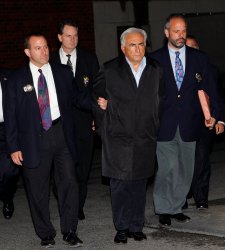
The arrest of ex-IMF chief Dominique Strauss-Kahn on attempted rape charges has unleashed a soul-searching in French politics, media and law that seems to deepen rather than wane as his case progresses.
Strauss-Kahn, who will plead not guilty Monday to charges he tried to rape a maid in a New York hotel, had been a likely future French President before his dramatic arrest three weeks ago as he sat in an airplane waiting to take off for Paris.
"The Strauss-Kahn affair is going to change a lot of things," said Chantal Brunel, a member of the ruling UMP party and spokeswoman for France's observatory on sexual equality.
Sunday's Journal du Dimanche published an outpouring of allegations by female members of parliament about crude remarks by male legislators to their women colleagues and staff under the headline: "Routine sexism in parliament."
Just two weeks after Strauss-Kahn's arrest, a junior minister was forced to fight allegations of sexual harassment of two female staff members, one of whom said the case encouraged her to come forward.
Prosecutors also opened an inquiry last week into accusations aired on a TV talk show that another former minister engaged in acts of pedophilia in Morocco.
Brunel said the scandal was ending a law of silence surrounding sexism in French politics and society. "The Strauss-Kahn affair has awakened fear in men who try to sexually dominate women," she said in an Internet debate this week.
France has long celebrated its respect for privacy and red-blooded stance on relations between the sexes, in contrast to what is often seen as puritanical Anglo-Saxon mores. Its media, meanwhile, has discretely turned a blind eye to the sex lives of its political elite.
CASE WOULD NEVER HAVE COME TO LIGHT
Support groups for victims of sexual violence in France estimate that the 10,000 rape cases reported last year may represent only one-tenth of the actual total.
Part of the victim's reluctance to come forward may be explained by the difficulty of France's judicial process, particularly when the rich and powerful are involved.
"In France, a case like this would never have come to light," said one magistrate, who asked not to be identified.
The speed of Strauss-Kahn's case has surprised many in France, where high-profile trials often become bogged down in years of legal wrangling. Former President Jacques Chirac is still being investigated for accusations of misuse of public funds dating back to the 1990s.
The differences between the two judicial systems have led to misunderstandings, with many French feeling Strauss-Kahn was victimized by the routine American "perp walk," which would be illegal in the "Hexagone."
While America relies heavily on the jury system and an adversarial relationship between defense and prosecution, French law is based on the Napoleonic code, offering suspects more privacy, and putting an investigating magistrate in charge of collecting evidence for both the defense and prosecution.
Critics in France say America's system favors the wealthy who can afford top lawyers. But many also recognize that France's prosecutors -- who are named by the president and decide whether or not to bring a case -- can shelter suspects.
"Can you imagine the public prosecutor of Paris ordering the arrest of Strauss-Kahn in a plane after being accused by a maid?" asked the magistrate, saying a prosecutor would probably first have ordered an enquiry which would have lasted years.